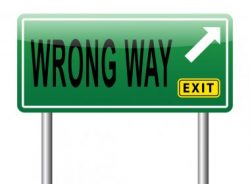“Takers” – A Result of the Imp of the Perverse? Part 1: A Preposterous Explanation for Disastrous Decisions
April 2, 2019 ~ Written by: W.B. “Bud” Kirchner
Approx. Read Time: 14 Minutes
“There is no passion in nature so demoniacally impatient, as that of him who, shuddering upon the edge of a precipice, thus meditates a Plunge.” ― Edgar Allan Poe, The Imp of The Perverse
Disclaimer
I start with a verbatim disclaimer I have used previously with articles on this theme:
Kirchner Group was founded 35-years ago on what was back then an unusual commitment to the philosophy of a values-based business, including what we termed ‘earning and returning’. This approach has been documented in previous articles and during a PBS interview which was chosen as ‘Interview of the Year’.
To put it another way, our entire team has devoted our careers to creating real value – not using our talents to create the perception of value or short-term versions of value.
I am firm believer in creating value the old-fashioned way (heavy lifting/long term view etc.) In my opinion, while ‘financial engineering’ can be a tool, it is a dangerous one and one that is used far too often. As described by the PBS Interviewer:
“Acting with values contrary to the sophisticated and terrible financial engineering” – Bob Scully
Format
In this blog post I will put forth the preposterous explanation, while part two will describe still more explanations for the dichotomy that is making and taking, as introduced initially in the work of Rana Foroohar.
Literary Background
“To-day I wear these chains, and am HERE. To-morrow I shall be fetterless!–BUT WHERE?” ― Edgar Allan Poe, The Imp of The Perverse
The concept of ‘takers’ is so foreign to me that I find myself struggling to understand how they have come to be and in midst of this query, I find myself thinking about an Edgar Allan Poe story “The Imp of the Perverse”.
Poe’s “The Imp of the Perverse,” is an essay about inappropriate impulses. “The impulse increases to a wish, the wish to a desire, the desire to an uncontrollable longing.” (Carey)
The perversion here reflects a thought or action that goes against our natural instinct for survival and self-preservation. It is the act of self-sabotage that is equivalent to jumping off a cliff or letting go of the wheel while driving. Poe himself defined it as the defiance of all consequences or doing wrong for wrongs sake. He described the perverse as “a shadow that flits across the brain”.
Carey has pointed out that this topic occurs in several places in the world of literature. The exploration of perverse urges has a rich history from Poe to the Marquis de Sade to Freud’s repressed desires and Darwin’s observation that many actions are performed “in direct opposition to our conscious will.” (Carey) Is this part of human behavior?
“Experiencing unpleasant intrusive thoughts is a common, and unthreatening, phenomenon, but how we deal with it can be dangerous. While scary to dwell on, such thoughts are actually quite common. Research shows that up to 90 percent of people without a diagnosed mental illness experience what psychologists have labeled “intrusive thoughts.” (Ikem)
In short, what I am suggesting is a literary perspective on a business behavior.
Does Being a Taker Qualify?
“There lives no man who at some period has not been tormented, for example, by an earnest desire to tantalize a listener by circumlocution.” ― Edgar Allan Poe, The Imp of The Perverse
What evidence exists to illustrate that the decision to be a “taker” is indeed perverse? If we accept the proposition that empathy is a fundamental human characteristic (Einfühlung) then is not a decision to “exploit or disadvantage others” clearly an imp of the perverse?
How absurd is the construct that I am building here? Well, while I would agree succumbing to the typical example of an imp, temptation to jump off a cliff is truly not in one’s best interest. I would propose that exploiting people, resources etc. is equally self-destructive or at the least wrong minded. While I admit one has repercussions directly to an individual, the other has consequences to the world around. It is, of course, a world for which we are all responsible.
I end this section with what I would describe as an operational definition from Carey: “The visions seem to swirl up from the brain’s sewage system.” Could this explain the smell that is ‘taking’?
In other words, the leap of logic that I am proposing here is that while the imp of the perverse is easily grasped in the context of the direct impact on yourself, similarly, the perversity can be extended to the impact on the world around you.
How Perverse is This?
“They who are of the opinion that Money will do everything, may very well be suspected to do everything for Money”. – George Savile, Complete Works, 1912
How about some examples of documented outcomes of “takers” that seem to qualify for Poe’s definition of doing wrong for wrongs sake?
I believe one of the big contributions here is some contexts (reality checks) quoted from Rana Foroohar – Makers and Takers – The Rise of Finance and the Fall of American Business:
- Rather than funding the new ideas and projects that create jobs and raise wages, finance has shifted its attention to securitizing existing assets (like homes, stocks, bonds and such), turning them into tradeable products that can be sliced and diced and sold as many times as possible.
- How did finance, a sector that makes up 7 percent of the economy and creates only 4 percent of all jobs, come to generate almost a third of all corporate profits in America?
- Virtual enterprises prosper while real ones, with real workers, struggle. Innovation is falling to cash management, long-term to short-term tricks. Risk in the financial system continues to rise, even as risk capital to real businesses declines.
- As a sign we have not figured it out: Every recovery of the post-World War II period has been longer and weaker than before.
- Finance would rather invest in areas like real estate and construction which are far less productive but offer quicker more reliable short-term gains (as well as collateral that can be sold in a crisis or secure ties in boomed times).
- The move from the “retain and reinvest” corporate model “to a down size in distribution” is in large part responsible for a national economy characterized by economic inequality employment instability and diminished innovative capability.
- In 2030, is when the largest demographic group in US history “the baby boomers” will have nearly depleted the social security trust fund. It is also when the older generation X’s will begin to move out of the work and into retirement.
Reflection
How impactful is the counterproductive decisions that are being made? I quote Alain Sherter, Managing Editor at CBS News, reflecting on lingering issues:
- The share of national income captured by the richest 10 percent of Americans rose from 34 percent in 1980 to 47 percent in 2016.
- Between 1980 and 2016, the share of America’s income going to the top 1 percent nearly doubled, while that going to the bottom plunged 50 percent.
- After declining following the Depression, the top 1 percent’s share of wealth in the U.S. has shot back up roughly to where it was in the 1930s.
- Between 1970 and 2016, the gap between the richest and poorest Americans jumped 27 percentage points.
- As of 2017, by some measures, CEOs at large companies on average earned more than 300 times what the typical worker made, up from 58 times in 1989 and 20 times in 1965.
- In 2015 the combined wealth of the planet’s sixty-two richest individuals was estimated to be about the same as that of the bottom half of the world’s population – 3.5 billion people.
Source: Alain Sherter – Lehman Brothers is long gone, but the economic rot lingers
Are We Trying to Make it Right?
“The real measure of your wealth is how much you’d be worth if you lost all your money.” – Author Unknown
Given the impact of this imp of the perverse – or whatever you call it (or however you rationalize it), have we started to build counterbalance into the system? What can we reference with regard to efforts in this context? I have selected the following from a long list provide by Rana Foroohar:
- “Only half of all MBA programs make ethics a required course”
- “Only 6 percent deal with issues of sustainability in their core curriculum”
Perhaps my premise as a version of The Imp of the Perverse is incorrect and it is simply that some people are just bad – ________________ (you fill in the blank).
Or – Are We Trying to Rationalize It?
“Right is right even if no one is doing it; wrong is wrong even if everyone is doing it.” – Augustine of Hippo
Further evidence of the sense that ‘taking’ is wrong is the efforts that have been put forward to rationalize it (kind of like when a kid rationalizes taking a cookie because it ‘looked lonely’).
Steven Pearlstein, a Pulitzer Prize-winning business and economics columnist for the Washington Post has reflected on the delusional arguments that have been put forth:
- “Greed, a natural human instinct, makes markets work.”
- “Corporations must be run to maximize value for shareholders.”
- “Workers’ pay is an objective measure of economic contribution.”
- “Equality of opportunity is all people need to climb the economic ladder.”
- “Making the economy fairer will make it smaller and less prosperous.”
Postscript
In what may well be one of the more preposterous propositions I have written about – at least (I hope) this will cause some reflection.
This recent headline offers hope:
- Inequality is so bad, even Fox News anchors decry capitalism – Michael Massing, The Guardian
Bibliography
- David Brooks – The Remoralization of the Market
- Emile Gabriel Bruneau Ph.D. – The Imp of the Perverse
- Benedict Carey – Why the Imp in Your Brain Gets Out
- Rana Foroohar – Makers and Takers – The Rise of Finance and the Fall of American Business
- Chinelo Nkechi Ikem – There’s a Name for That: The Imp of the Perverse
- Michael Massing – Inequality is so bad, even Fox News anchors decry capitalism
- Paul K. Piff – Wealth and the Inflated Self: Class, Entitlement, and Narcissism
- Paul K. Piff, Daniel M. Stancato, Stephane Cote, Rodolfo Mendoza-Denton, and Dacher Keltner – Higher social class predicts increased unethical behavior
- Edgar Allan Poe – The Imp of the Perverse
- Poe’s The Imp of the Perverse: Summary & Analysis
Relevant Business Brain Model Articles
- There Is A Special Place in Hell for Takers
- Financialization As A Symptom
- Human Nature As A Cause
- Two Steps Forward – One Step Back
- Our Wiring Isn’t Getting Any Better?!?!
- Makers & Takers: Why Can’t We Get This Right
- Einfühlung
About the Author: W.B. “Bud” Kirchner is a serial entrepreneur and philanthropist with more than 50 years of business success. He is not a scientist or an academic but he does have a diversified exposure to neuroscience, psychology and related cognitive sciences. Generally speaking, the ideas he expresses here are business-angled expansions of other people’s ideas, so when possible, he will link to the original reference.



